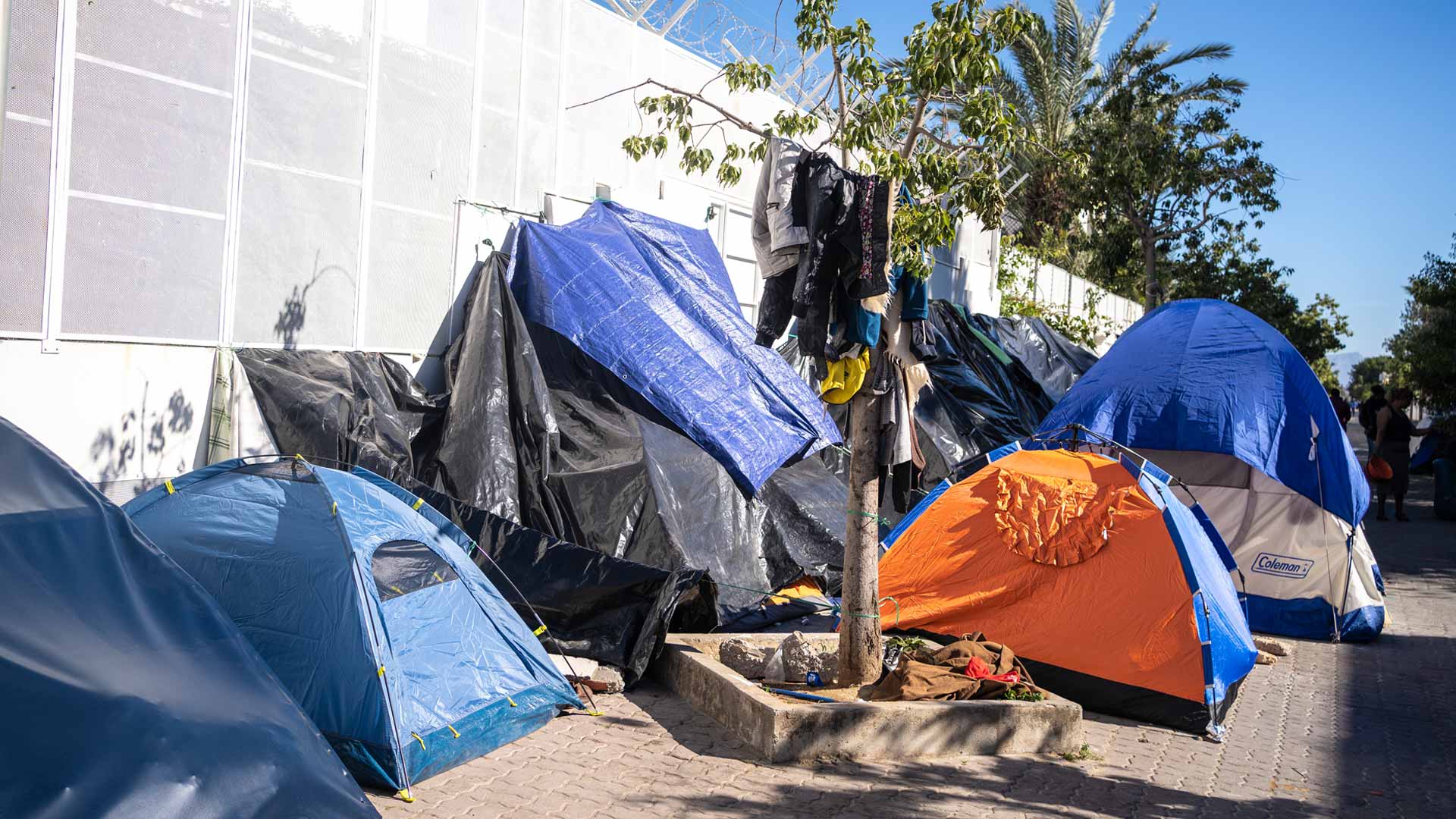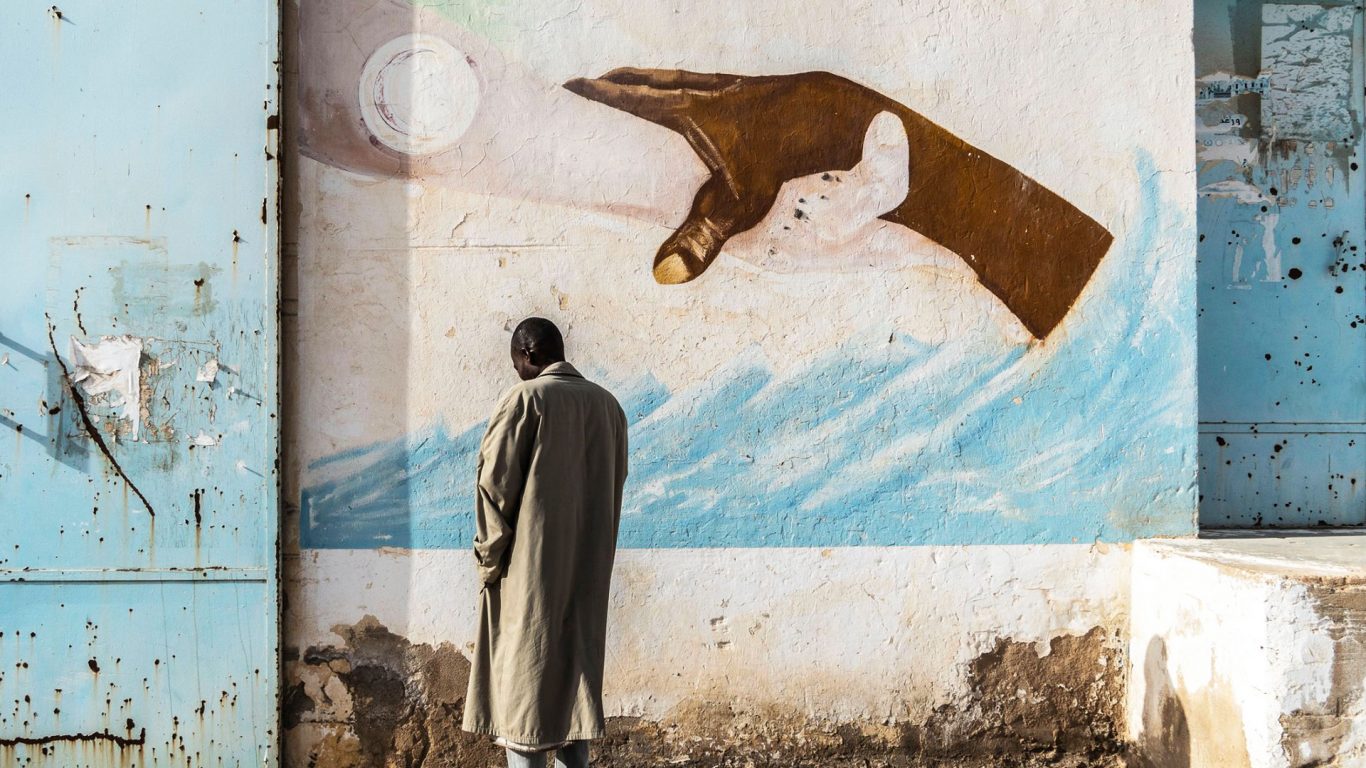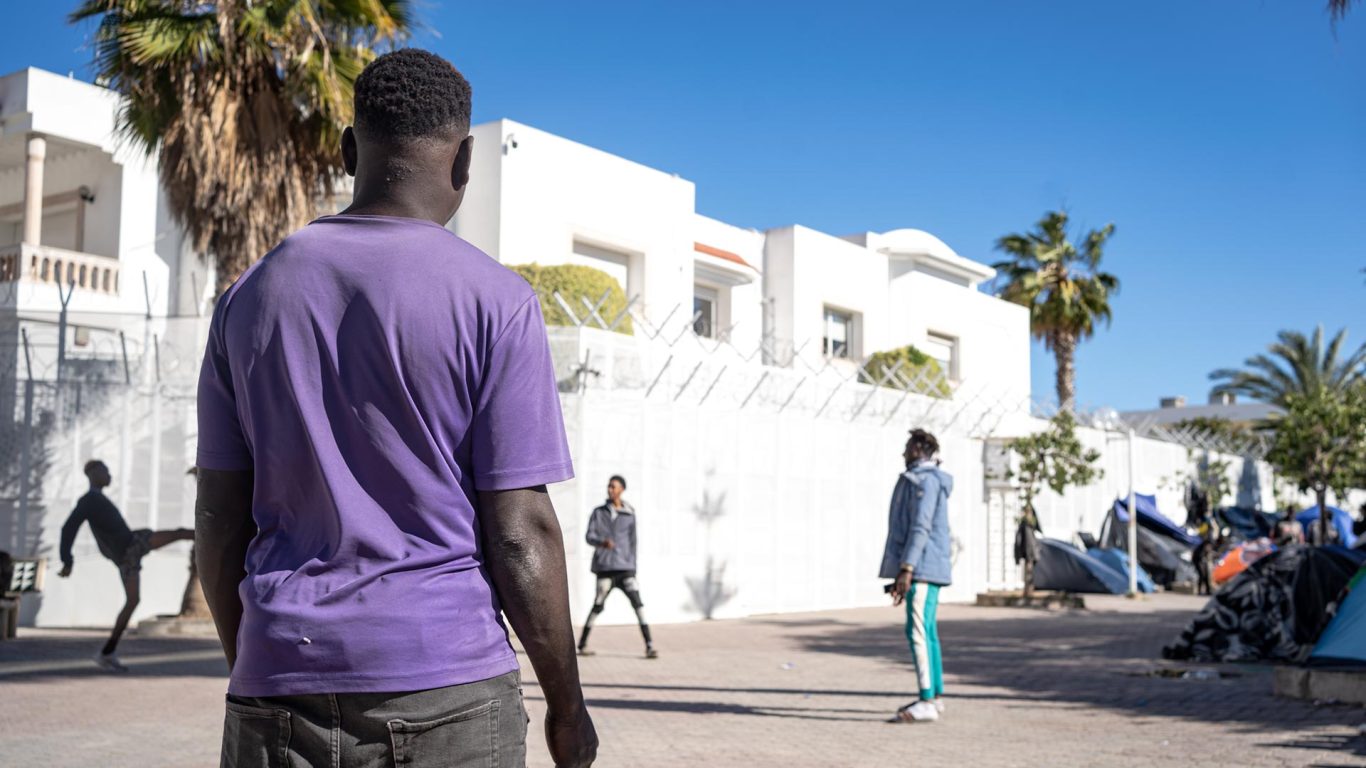By “them”, Kaïs Saïed means “irregular migrants”, to whom he devoted nearly 20 minutes of his speech, during the opening of his National Security Council on May 6, 2024.
Demonstrating his intransigence, Kaïs Saïed considers the intervention of Tunisia's armed forces and security forces necessary. The president also vilified the “networks and associations operating inside Tunisia, which falsely claim to protect these people.” His speech echoed a February 21, 2023 press release that associated irregular migration with “a criminal plan to change the composition of the demographic landscape in Tunisia”, and marked the launch of a first security campaign targeting sub-Saharan migrants.
On the same subject
Back then, Kaïs Saïed's comments were condemned by the African Union and led to calls for boycotts of Tunisian products in sub-Saharan Africa. That did not prevent Tunisian authorities from continuing to implement an increasingly punitive system, denounced by international organizations and endorsed by the May 6 speech.
A hostile environment
In his speech, Kaïs Saïed said that 400 people would be expelled to the eastern border. And for the first time, he referred to removal operations carried out since summer 2023 at least, in which migrants report being transported to the Algerian and Libyan borders, stripped of their personal belongings and abandoned to their fate without any supplies.
These operations had already been mentioned by the spokesperson for the National Guard, Houssem Eddine Jebali, in an interview on Telvza TV at the end of April 2024. Jebali said that "the removal operations from these areas aim to facilitate the work of our agents and transport illegal migrants."
"The places where they are are near the sea [...] The operations to remove them from these places are intended to facilitate the work of our agents, they are operations to transport illegal migrants," the National Guard spokesman said.
Houssem Eddine Jebali's interview coincided with a wave of arrests in El-Amra, southeast of Tunis. A large population of sub-Saharan migrants had settled in the small town since late August 2023. They had set up tents in olive fields, which were destroyed in the process.
Similar operations took place in Tunis on the night of May 2 to 3, when authorities destroyed the camp near the headquarters of the International Organization for Migration (IOM) and the United Nations High Commissioner for Refugees (UNHCR).
On the same subject
During the intervention, police also arrested several migrants. Some were reportedly transported the same day to the governorate of Jendouba, and then abandoned in a border area with Algeria.
“It was a group of 35 people, among which several children and elderly people,” said David Yambio, spokesperson for Refugees in Libya, an NGO that monitors the treatment of migrants both in Libya and Tunisia. The activist said the migrants then tried to return to the capital by foot.
“The journey was tumultuous. As they made their way toward Tunis, they were faced with constant rain, as well as repeated attacks from local residents,” David Yambio said.
At the end of April, several citizens were allegedly involved in violence targeting migrants. Videos posted on social media on the evening of May 5 show a firework mortar attack against a group of sub-Saharan people in Sfax. The city had already been the scene of violence in July 2023. In Sousse, people were filmed helping the police arresting migrants trying to escape a security campaign organized in the city on May 10, during which 58 migrants were arrested.
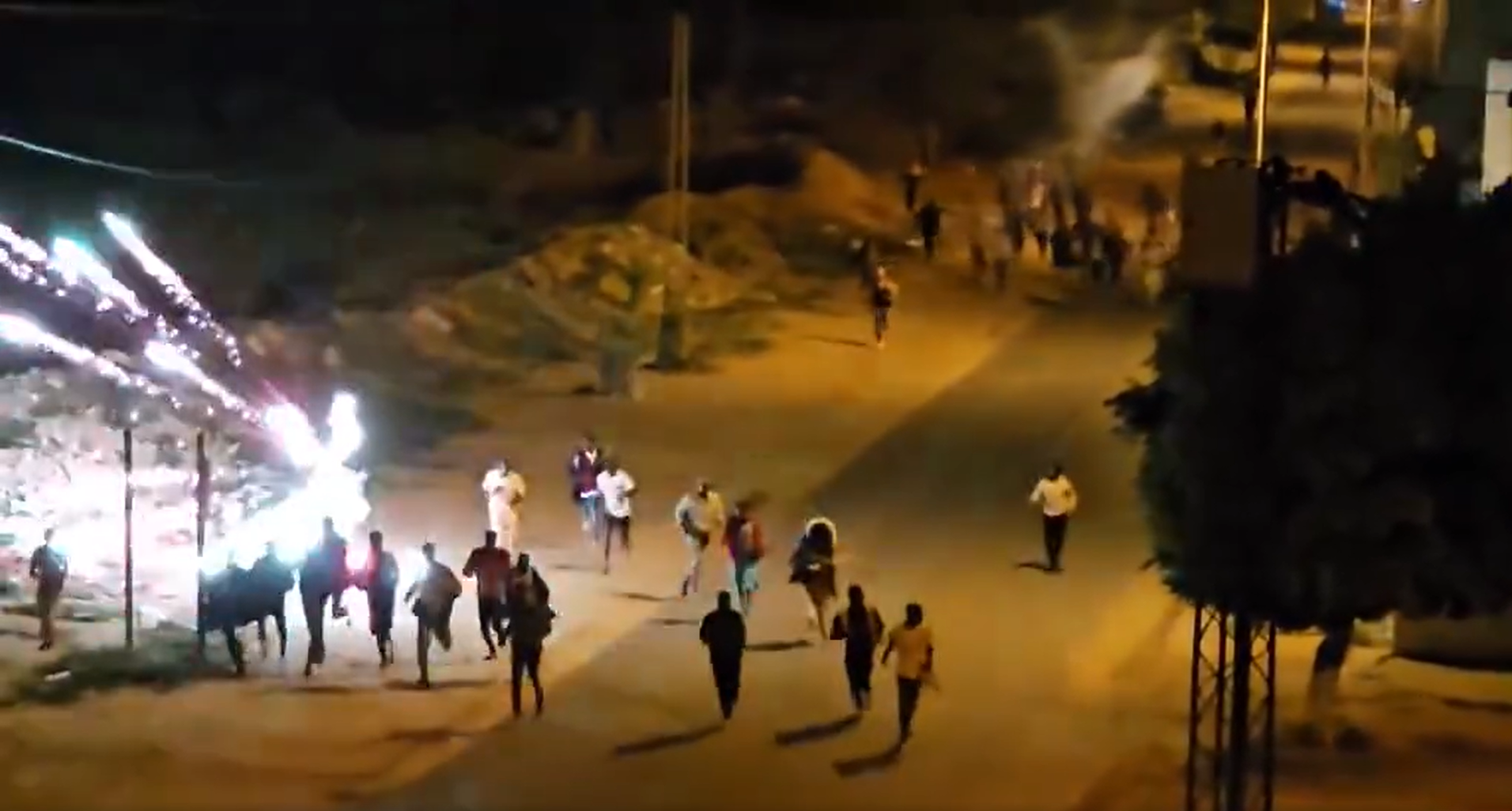
In the Cité Erriadh district of Sfax, a group of Sub-Saharan women were attacked on the night of 2 to 3 May 2024.
On May 12, 2024, on his way to play football with his friends, as he does every Sunday, near the city center of Sfax, Yvick* was attacked by a group of young Tunisians. “They were four, they asked me to give my bag and my phone,” said the young Cameroonian migrant, who arrived in Tunisia three years ago.
“I gave them my bag with my shoes, but I didn’t want to let go of my phone." He said that despite the presence of many witnesses, “no one came to my rescue” or reacted. “One of them took out a small machete and wanted to hit me in the neck, I ran away,” said Yvick, who then sought treatment at the Habib Bourguiba hospital.
Warning: the following pictures may shock

A photograph of Yvick's injury before and after treatment at the Habib Bourguiba Hospital.
In his May 6 speech, Kaïs Saïed emphasized his wish to welcome “migrants who come within a legal framework”. However, the sub-Saharan community is worried. “The police stopped me in the street, and they put me on a bus with other migrants, even though I had my papers on me!” said Edgar*, a young Cameroonian studying in Sfax. In February 2024, he was arbitrarily arrested by the Tunisian police.
“The officers didn't seem to believe me when I showed my documents,” he says. “If there hadn’t been urgent intervention from my university, I would certainly have ended up in the desert, like the rest of the group!”
Associations and aid for migrants targeted
In the wake of this intensification of the security campaign, a bill “amending and complementing” the 1968 law on the status of foreigners in Tunisia was submitted to the general legislation committee of the Assembly of Representatives of the People (ARP) on May 9, 2024.
The new text strengthens sanctions against assistance to so-called "irregular foreigners". So far, according to article 25, “any person who knowingly directly or indirectly helps or attempts to facilitate entry, exit, circulation or the irregular stay of a foreigner in Tunisia” faces a prison sentence of “1 month to 1 year and a fine of 6 to 120 dinars”.
Now, sanctions would reach “one to three years imprisonment and a fine, ranging from one thousand to five thousand dinars”.
At the beginning of May, several people across the country were placed in police custody for having hosted undocumented people. In the meantime, arrest and search operations targeted associations working with migrants.
Between May 3 and 7, the premises of at least four associations were raided, including the Tunisian Council for Refugees (CTR), Terre d'Asile Tunisie and the Norwegian Refugee Council. Activist Saadia Mosbah, president of the anti-racist association Mnemty, was placed in prolonged police custody before a committal warrant was issued against her on May 16.
“The security policy not only affects migrants, but also aims to criminalise solidarity,” said Romdhane Ben Amor, spokesperson for the Tunisian Forum for Social and Economic Rights (FTDES). Several other heads of associations were placed in police custody, including the former president of Terre d'Asile Tunisie, Sherifa Riahi.
In total, at least seven people have been or are still detained for their involvement in associations helping migrants. In Sousse, an arrest warrant was also issued against former municipal councilors, who are accused of having worked with these organizations.
On May 6, Kaïs Saïed highlighted his intention to limit the room for maneuver of associations helping migrants. “Associations will never replace the State,” he said while castigating —without explicitly naming the association — the project for emergency accommodation of asylum seekers in hotels supported by the Tunisian Council for Refugees.
Kaïs Saïed also called to action the Tunisian Red Crescent (CRT), an organization much closer to the government. The CRT is, for example, one of the very few associations allowed to intervene in border areas, or in burial operations for the bodies of migrants .
The silence of the international and national community
International organizations working to support migrants and refugees have so far not reacted to these events. Contacted by inkyfada, the International Organization for Migration (IOM) said it was carrying out “field assessments to target urgent needs” and that it had contributed to supporting 5,472 migrants in different ways, without commenting on the El-Amra police operation. The UNHCR has not yet responded to inkyfada’s requests.
To date, the Tunisian associations targeted by the wave of arrests have also refrained from reacting. When contacted, some of them explained that they did not want to communicate about the procedures in progress. For the moment, only the Tunisian Association of Democratic Women (ATFD) has condemned the arrest of Sherifa Riahi, while Mnemty issued a press release demanding the “immediate release and an end to all prosecutions” against the association and Saadia Mosbah.
Part of civil society also noted the EU's silence. On May 9, several activists organized a demonstration in front of its local representation headquarters, a few hundred meters only from the UNHCR. For Ben Amor, who was there with a megaphone in hand, “the European Union is the main responsible for this crisis.”
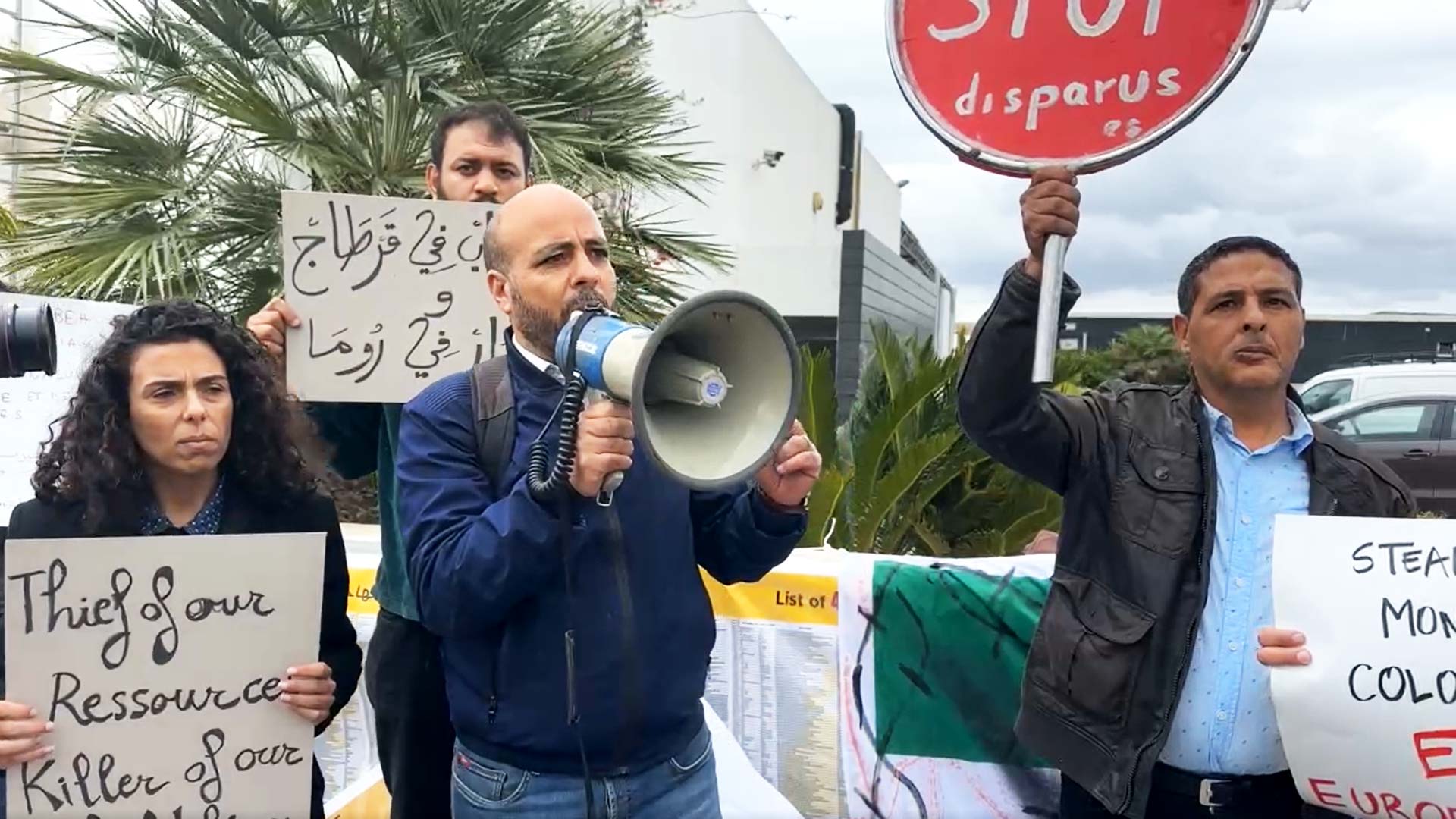
Romdhane Ben Amor and other members of Tunisian civil society in front of the headquarters of the EU delegation in Tunis on 9 May 2024.
"The EU has managed to transfer the weight of the migration crisis to transit countries."
The EU diplomatic service finally reacted in a May 14 press release, communicating its concern over “the simultaneous arrests of several figures from civil society, journalists and political figures,” without mentioning the arrests of migrants.
For Romdhane Ben Amor, “the EU has managed to transfer the weight of the migration crisis to transit countries, through partnerships or donations, especially in the security area." He and other demonstrators present that day believe the memorandum of understanding signed in July 2023 between the Tunisian government and the European Commission ratifies “ a continuity of political plans for migration management, whether in northern countries, and now in southern countries. ”
